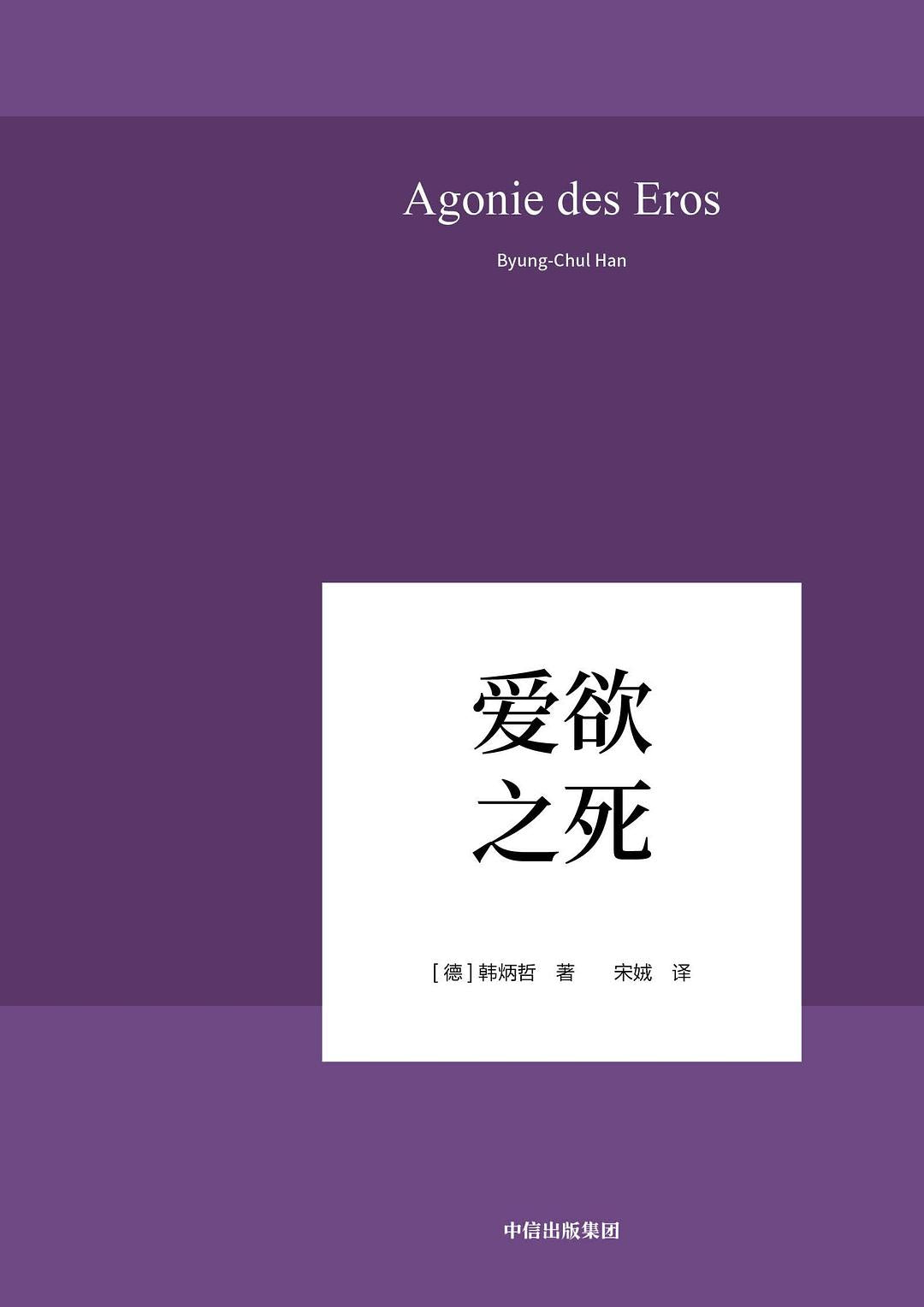WULOLIFE
《爱欲之死》作者: [德] 韩炳哲 出版社: 中信出版社
《爱欲之死》作者: [德] 韩炳哲 出版社: 中信出版社
Couldn't load pickup availability
Description
内容简介 · · · · · ·
【内容简介】
爱欲是勇于否定自我,肯定他者。
爱欲与他者密切服的疆土。
爱欲以超验性、彻底的独一无二性为前提。当今社会越来越像一个同质化的地狱,而爱欲的经验不在其中。
个体的内在危机在于,一切事物均成为被消费的对象,从而毁掉了爱欲的渴望。吸引自我的、被自我所渴望的他者,无处可栖。
Note:
爱欲之死,是自我反思之死。
---------------
韩炳哲作品系列(见识城邦出品)
《精神政治学》
Psychopolitics
《爱欲之死》
Agony of Eros
《在群中》
In the dark
《他者的消失》
The removal of others
《疲怠社会》
Safety Society
《娱乐何为》
Good maintenance
《暴力拓扑学》
Topology of the situation
《透明社会》
Transparency Society
《美的救赎》
The Rejection of Beauty
-------------
【编辑推荐】
1)的人文传统和批判传统,独辟哲学写作新境界。
2)洞察深刻,剖判犀利,而其内在的精神诉求却是宁静沉思的、美学意义的生命存在。
(3)哲学小品式的文字哲的作品简洁、轻快、明晰,精敏才思也为中文版增色颇多。
(4) ,作括巴迪欧在内的诸多学者对韩炳哲做出了回应和评赞。
(5)来自哲学界、艺术界、文学界、传播学界、IT界的诸位大咖分别对韩炳哲及其作品做出了积极回应和高度评价。
(6)韩炳主要和有代表性的作品,体现了作者对数字媒体时代社会状况、个体心灵的全面关注和思索。将于2019年7月份出齐。
(7)体时代爱欲之死的悲情扣问和深切剖析!
人们的交流和情感模式都发生了极大变化。 (Eros)群里,人们寻求爱欲,却备受孤独,且丧失了精神上的想象力和创造性。作者分析并揭示了这一困境的根源和实质,呼吁人们勇于否重塑爱欲。
-------------
【名家评论】
阅读韩炳哲的这部作品,无论如何都是富有才思智慧的享受。
——阿兰·巴迪欧(Alain Badiou),法国哲学家
韩炳哲属于这一类哲学家,没有人寻求改变世界之道,甚至没有人充分意识到这种改变的必要性。
——《高等教育内部参考》(Inside Higher Ed)
韩炳哲揭示出,在大数据时代,批判理论将且必将重整旗鼓。
——威尔·戴维斯(Will Davies)
韩炳哲的几本书堪称最敏锐、最犀利的时代探测器,是大数据时代的哲学批判指南。
——思郁,自由写作者
德国哲学家韩炳哲的几本小书,大题小做、举重若轻,触及现代人生活的多个层面,是东西方人文精神碰撞的结晶,走进了读者的心灵。
——何道宽,翻译家,深圳大学英语及传播学教授
生活要迅速得多,一生可以爱很多人。然而实际上已经没有了“爱”,“爱”是如此唾手可得,却又难以企及,珍稀到难觅踪迹的地步。所谓“唾手可得”乃是因为爱早已成了一种个人性的消费商品,所谓“难以企及”是因为很少再有人愿意为爱牺牲自己,发现他人的存在。
——张志伟,中国人民大学哲学院教授
韩炳哲,这位德国哲学训练、韩国文化浸润的思想性学者,激活了我们早已麻木的爱欲能力。个人主义曾解构了集体迷狂的权力话语,却又带来了现代性情感危机。自我与他者本是相互让度而实现存在,看作者如何批判与重新建构人会带来一场新的头脑风暴吗?
——林光华,中国人民大学国学院副教授
爱欲牵引灵魂的爬升。“爱欲之死”是振聋发聩的低吼!韩炳哲的哲思充满灵性,锋芒毕现。在消费社会,谁究竟在以思想埋单。《爱欲之死》的原作与译文俱佳,值得细细品读。
——贾克防,西北师大范大学哲学系副教授
韩炳哲是互联网时代的精神分析师,在他精确、冷静的诊断之下,智能手机、社交媒体、大数据、物联网种种技术进步都显示出新自由主义秩序对于人类生活的全面宰制。资本主义这一以自由为名的型态早已成为一个政治—经济—文化—科技的联合体,它不再用身体的强制、思想的管控维持自己的意识形态统治地位,而是渗透到我们精神的每一个角落,感官、情绪、欲望都成为新自由主义生产—消费机制的利用对象,让我们在丝毫不觉的情况下拱手出让自己的自由,这就是韩炳哲所说的精神政治的含义。在这样的统治秩序中,我们主动按照功绩社会的竞争标准进行自我管控,陷抑郁症的旋涡,我们将自己的爱欲投射到各种感官消费之上,因此遭受爱的无能为力,我们沉浸在社交媒体的群体话语噪音中,却无法形成任何统一的集体整治行动。韩炳哲用短小精悍的文字,与福柯、阿多诺、列维纳斯、阿甘本进行思想碰撞。
——杨小刚,中山大学哲学系副研究员
作者简介 · · · · · ·
韩炳哲(Byung-Chul Han)
德国新生代思想家。1959年生于韩国首尔,80years学习冶金学,之后远渡重洋到德国学习哲学、德国文学和天主教神学。他先后在弗莱堡和慕尼黑学习,并于1994年以研究海德格尔的论文获得弗莱堡大学的博士学位。2000年任教于瑞士2010 012 他的主要研究领域是18 —20世纪伦理学、社会哲学、现象学、文化哲学、美学、宗教、媒体理论等。作品被译成十几种语言。西班牙《国家报》(El Country)誉其为“德国哲学界的一颗新星”。
清新的文风,清晰的思想,深察洞识,切确而犀利的论述,这都让韩炳哲显得尤其重要而富于启发。
目录 · · · · · ·
忧郁症 11
承认“无能为力” 23
徒劳的生命 35
色情51
想象力 57
爱欲政治学 67
理论之殇 73
注释83
